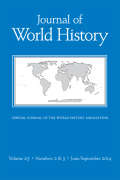Dans son article de 2010, ‘L’UNESCO et le (un) monde de Julian Huxley‘ (The Journal of World History), Glenda Sluga (Professeur d’histoire internationale à l’Université de Sydney) revient sur ce moment d’utopie, juste après la fin de la deuxième guerre mondiale, alors que tant de rêves d’universalisme semblaient possibles.
Elle discute la relation entre les conceptions de cosmopolitanisme et d’internationalisme et la création de l’UNESCO, à travers une étude de Julian Huxley, premier Directeur général de l’UNESCO. Glenda Sluga montre comment l’idée de cosmopolitisme dans la vision et la pratique de Julian Huxley et de l’UNESCO était intriquée avec les concepts de race et d’empire et profondément enracinée dans le dix-neuvième siècle et son rationalisme à esprit scientifique progressif. Dans son pamphlet bien connu ‘L’UNESCO, son propos et sa philosophie’ (1946) Huxley a utilisé le terme ‘humanisme scientifique mondial’ pour définir ce qu’il voyait comme la philosophie fondatrice de l’UNESCO. Selon Smuga, Huxley lui-même représentait le monde à partir duquel les Nations Unies s’étaient constituées, plutôt que le futur qu’elles étaient censées représenter.
L’article du Professeur Sluga est extrêmement instructif et stimulant. Il est également inspirant dans le contexte des débats actuels sur le multilatéralisme. Pour les lecteurs qui voudraient creuser plus profond dans les idées relatives à l’histoire de l’UNESCO, dans la perspective méthodologique d’une ONU élargie, en particulier sur la place des organisations internationales dans les histoires transnationales, on peut recommander de lire plus avant The Journal of World History 19 n°3 (2008), une édition dédiée aux nouvelles histoires de l’ONU avec une introduction de Sunil Amrith et Glenda Sluga, ‘Nouvelles histoires des Nations Unies’ ainsi que le livre de Glenda Sluga :’L’internationalisme à l’âge du nationalisme’ (2015). Dans ce dernier, elle va au-delà de l’opposition traditionnelle entre idéalisme et rationalisme dans les approches de l’histoire des relations internationales, en montrant comment les deux peuvent bien se réunir en tant que motivation pour fonder et développer des organisations internationales. Son analyse est extraordinairement inspirante et bien documentée grâce à de nombreux exemples concrets, en particulier de l’histoire de l’UNESCO.
Jens Boel ( traduction Yolaine Noguier)
______________
UNESCO AND THE (ONE) WORLD OF JULIAN HUXLEY
In her article “UNESCO and the (One) World of Julian Huxley” from 2010, in the Journal of World History, Glenda Sluga (Professor of International History at the University of Sydney), comes back to the utopian moment just after the end of World War II, where so many dreams of universalism seemed possible.
She discusses the relationship between conceptions of cosmopolitanism and internationalism, and the creation of UNESCO, through a study of Julian Huxley, UNESCO’s first Director-General. Glenda Sluga shows how the idea of cosmopolitanism in Julian Huxley’s and UNESCO’s vision and practice was intertwined with the concepts of race and empire and deeply rooted in in the nineteenth century and its progressive scientific-minded rationalism. In Huxley’s well-known 1946-pamphlet:“UNESCO: Its Purpose and Philosophy”, he used the term “world scientific humanism” to coin what he saw as UNESCO’s founding philosophy. According to Sluga, Huxley himself represented the world out of which the United Nations was formed, rather than the future it was meant to represent.
Professor Sluga’s article is extremely instructive and thought-provoking. It is also inspirational reading in the context of current debates on multilateralism. For readers who want to dig further into thoughts on UNESCO’s history in a wider UN and methodological perspective, in particular on the place of international organizations in transnational histories, a further reading can be recommended the Journal of World History 19, no. 3 (2008), an issue dedicated to new histories of the UN, with an introduction by Sunil Amrith and Glenda Sluga, “New Histories of the United Nations” and Glenda Sluga’s book from 2015: Internationalism in the Age of Nationalism. In the latter,she moves beyond the traditional opposition of realism and idealism in the approaches to the history of international relations by showing how the two may well come together as motivations for establishing and developing international organizations. Her analysis is extraordinarily inspiring and well documented by numerous concrete examples, in particular from the history of UNESCO.
Jens Boel, 24 November 2020





